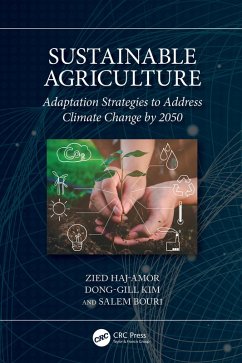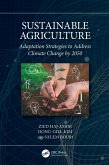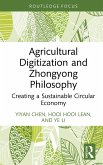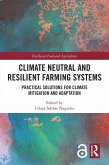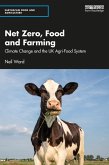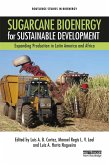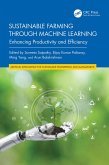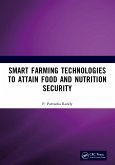Zied Haj-Amor, Dong-Gill Kim, Salem Bouri
Sustainable Agriculture (eBook, ePUB)
Adaptation Strategies to Address Climate Change by 2050
104,95 €
104,95 €
inkl. MwSt.
Sofort per Download lieferbar

52 °P sammeln
104,95 €
Als Download kaufen

104,95 €
inkl. MwSt.
Sofort per Download lieferbar

52 °P sammeln
Jetzt verschenken
Alle Infos zum eBook verschenken
104,95 €
inkl. MwSt.
Sofort per Download lieferbar
Alle Infos zum eBook verschenken

52 °P sammeln
Zied Haj-Amor, Dong-Gill Kim, Salem Bouri
Sustainable Agriculture (eBook, ePUB)
Adaptation Strategies to Address Climate Change by 2050
- Format: ePub
- Merkliste
- Auf die Merkliste
- Bewerten Bewerten
- Teilen
- Produkt teilen
- Produkterinnerung
- Produkterinnerung

Bitte loggen Sie sich zunächst in Ihr Kundenkonto ein oder registrieren Sie sich bei
bücher.de, um das eBook-Abo tolino select nutzen zu können.
Hier können Sie sich einloggen
Hier können Sie sich einloggen
Sie sind bereits eingeloggt. Klicken Sie auf 2. tolino select Abo, um fortzufahren.

Bitte loggen Sie sich zunächst in Ihr Kundenkonto ein oder registrieren Sie sich bei bücher.de, um das eBook-Abo tolino select nutzen zu können.
Ever-increasing population growth, combined with ongoing climate change signals that agriculture will face great challenges in ensuring global food security by 2050. Sustainable Agriculture: Adaptation Strategies to Address Climate Change by 2050 presents in-depth analysis, case studies, and adaptation options.
- Geräte: eReader
- mit Kopierschutz
- eBook Hilfe
Andere Kunden interessierten sich auch für
![Sustainable Agriculture (eBook, PDF) Sustainable Agriculture (eBook, PDF)]() Zied Haj-AmorSustainable Agriculture (eBook, PDF)104,95 €
Zied Haj-AmorSustainable Agriculture (eBook, PDF)104,95 €![Agricultural Digitization and Zhongyong Philosophy (eBook, ePUB) Agricultural Digitization and Zhongyong Philosophy (eBook, ePUB)]() Yiyan ChenAgricultural Digitization and Zhongyong Philosophy (eBook, ePUB)20,95 €
Yiyan ChenAgricultural Digitization and Zhongyong Philosophy (eBook, ePUB)20,95 €![Climate Neutral and Resilient Farming Systems (eBook, ePUB) Climate Neutral and Resilient Farming Systems (eBook, ePUB)]() Climate Neutral and Resilient Farming Systems (eBook, ePUB)0,99 €
Climate Neutral and Resilient Farming Systems (eBook, ePUB)0,99 €![Net Zero, Food and Farming (eBook, ePUB) Net Zero, Food and Farming (eBook, ePUB)]() Neil WardNet Zero, Food and Farming (eBook, ePUB)38,95 €
Neil WardNet Zero, Food and Farming (eBook, ePUB)38,95 €![Sugarcane Bioenergy for Sustainable Development (eBook, ePUB) Sugarcane Bioenergy for Sustainable Development (eBook, ePUB)]() Sugarcane Bioenergy for Sustainable Development (eBook, ePUB)41,95 €
Sugarcane Bioenergy for Sustainable Development (eBook, ePUB)41,95 €![Sustainable Farming through Machine Learning (eBook, ePUB) Sustainable Farming through Machine Learning (eBook, ePUB)]() Sustainable Farming through Machine Learning (eBook, ePUB)103,95 €
Sustainable Farming through Machine Learning (eBook, ePUB)103,95 €![Smart Farming Technologies to Attain Food and Nutrition Security (eBook, ePUB) Smart Farming Technologies to Attain Food and Nutrition Security (eBook, ePUB)]() P. Parvatha ReddySmart Farming Technologies to Attain Food and Nutrition Security (eBook, ePUB)52,95 €
P. Parvatha ReddySmart Farming Technologies to Attain Food and Nutrition Security (eBook, ePUB)52,95 €-
-
-
Ever-increasing population growth, combined with ongoing climate change signals that agriculture will face great challenges in ensuring global food security by 2050. Sustainable Agriculture: Adaptation Strategies to Address Climate Change by 2050 presents in-depth analysis, case studies, and adaptation options.
Dieser Download kann aus rechtlichen Gründen nur mit Rechnungsadresse in A, B, BG, CY, CZ, D, DK, EW, E, FIN, F, GR, HR, H, IRL, I, LT, L, LR, M, NL, PL, P, R, S, SLO, SK ausgeliefert werden.
Produktdetails
- Produktdetails
- Verlag: Taylor & Francis
- Seitenzahl: 254
- Erscheinungstermin: 11. Dezember 2023
- Englisch
- ISBN-13: 9781003815990
- Artikelnr.: 69353127
- Verlag: Taylor & Francis
- Seitenzahl: 254
- Erscheinungstermin: 11. Dezember 2023
- Englisch
- ISBN-13: 9781003815990
- Artikelnr.: 69353127
- Herstellerkennzeichnung Die Herstellerinformationen sind derzeit nicht verfügbar.
Dr. Zied Haj-Amor's research interests primarily focus on soil and water management under climate change, sustainable agriculture, and climate change resilience in agroecosystems. He has conducted various research projects on soil salinity in Africa and is currently conducting research at Water, Energy and Environment Laboratory, Sfax University in Tunisia. He collaborates extensively with researchers in Africa and Europe to improve productivity of saline soils under climate change.
Dr. Dong-Gill Kim's research interests primarily focus on carbon sequestration, greenhouse gas mitigation, and climate resilience in agroecosystems. He has conducted various carbon and greenhouse gas research projects in South Korea, the USA, Ireland, and New Zealand and is currently working at Wondo Genet College of Forestry and Natural Resources, Hawassa University in Ethiopia. He collaborates extensively with researchers in Africa, Europe, and North and Latin America to enhance food security and greenhouse gas mitigation in smallholder farming systems. He earned his Ph.D. in Environmental Science from Iowa State University in the USA.
Prof. Salem Bouri is a Professor of Earth Sciences at Faculty of Sciences Sfax, Tunisia. He has published over 100 peer-reviewed papers in reputed international journals and conferences. He has conducted many research projects on shallow and deep groundwaters in Tunisia. The current research interests of Prof. Salem Bouri include water management, climate change, geo-informatics, hydrogeology, and sustainable agriculture.
Dr. Dong-Gill Kim's research interests primarily focus on carbon sequestration, greenhouse gas mitigation, and climate resilience in agroecosystems. He has conducted various carbon and greenhouse gas research projects in South Korea, the USA, Ireland, and New Zealand and is currently working at Wondo Genet College of Forestry and Natural Resources, Hawassa University in Ethiopia. He collaborates extensively with researchers in Africa, Europe, and North and Latin America to enhance food security and greenhouse gas mitigation in smallholder farming systems. He earned his Ph.D. in Environmental Science from Iowa State University in the USA.
Prof. Salem Bouri is a Professor of Earth Sciences at Faculty of Sciences Sfax, Tunisia. He has published over 100 peer-reviewed papers in reputed international journals and conferences. He has conducted many research projects on shallow and deep groundwaters in Tunisia. The current research interests of Prof. Salem Bouri include water management, climate change, geo-informatics, hydrogeology, and sustainable agriculture.
Part 1: Climate Change by 2050. 1. Global Climate Change: Its Main Indicators by 2050. 2. Climate Change in Europe: Past Trends and Key Indicators by 2050. 3. Africa: Past and Future Trends of Greenhouse Gas Emissions and Climate Change Indicators by 2050. 4. Climate Change in Asia: Past Observations, Future Trends and Opportunities for Achieving Global Climate Neutrality by 2050. 5. Climate Change in North America: Past Indices, Future Trends, and Pathways to Net-Zero Greenhouse Gas Emissions By 2050. Part 2: Climate Change Effects on Agriculture by 2050. 6. Global Agricultural Production under Climate Change by 2050: Implications for Global Food Security. 7. European Agriculture under Climate Change: Past Observations and Projected Figures by 2050. 8. Climate Change Effects on African Agriculture: Observation and Projected Trends by 2050. 9. Past and future (2050) effects of climate change on Asian Agriculture. 10. Agricultural Production in North America under Climate Change by 2050: Case studies from the USA and Canada. Part 3: Adaptation Strategies to Address Climate Change for Global Food Security. 11. Options and Constraints for Meeting the Challenge of Increasing Global Agricultural Production. 12. European Policies and Measures for Aligning Climate Targets with Agricultural Productivity Goals. 13. Effective Agricultural Adaptation Measures to Support Africa in Achieving Food Security under Climate Change. 14. Enhancing Agricultural Production and Reducing Greenhouse Gas Emissions in Asia through Adaptation Measures. 15. Building a sustainable agroecological environment: insights into agricultural adaptation options in the USA and Canada. General Conclusions. General Recommendations (50 essential recommendations). References.
Part 1: Climate Change by 2050. 1. Global Climate Change: Its Main Indicators by 2050. 2. Climate Change in Europe: Past Trends and Key Indicators by 2050. 3. Africa: Past and Future Trends of Greenhouse Gas Emissions and Climate Change Indicators by 2050. 4. Climate Change in Asia: Past Observations, Future Trends and Opportunities for Achieving Global Climate Neutrality by 2050. 5. Climate Change in North America: Past Indices, Future Trends, and Pathways to Net-Zero Greenhouse Gas Emissions By 2050. Part 2: Climate Change Effects on Agriculture by 2050. 6. Global Agricultural Production under Climate Change by 2050: Implications for Global Food Security. 7. European Agriculture under Climate Change: Past Observations and Projected Figures by 2050. 8. Climate Change Effects on African Agriculture: Observation and Projected Trends by 2050. 9. Past and future (2050) effects of climate change on Asian Agriculture. 10. Agricultural Production in North America under Climate Change by 2050: Case studies from the USA and Canada. Part 3: Adaptation Strategies to Address Climate Change for Global Food Security. 11. Options and Constraints for Meeting the Challenge of Increasing Global Agricultural Production. 12. European Policies and Measures for Aligning Climate Targets with Agricultural Productivity Goals. 13. Effective Agricultural Adaptation Measures to Support Africa in Achieving Food Security under Climate Change. 14. Enhancing Agricultural Production and Reducing Greenhouse Gas Emissions in Asia through Adaptation Measures. 15. Building a sustainable agroecological environment: insights into agricultural adaptation options in the USA and Canada. General Conclusions. General Recommendations (50 essential recommendations). References.
